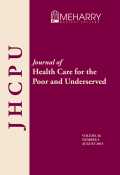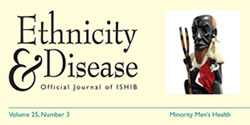U.S.-Brazil Joint Action Plan to Eliminate Racial & Ethnic Discrimination & Promote Equality (JAPER)
 CDC collaborates with partners globally on initiatives to promote health equity.
CDC collaborates with partners globally on initiatives to promote health equity.
One example is OMHHE’s collaboration with Brazil as part of the U.S.-Brazil Joint Action Plan to Eliminate Racial and Ethnic Discrimination and Promote Equality (JAPER).
About JAPER
U.S.-Brazil Joint Action Plan to Eliminate Racial and Ethnic Discrimination and Promote Equality (JAPER)
The United States and Brazil share a commitment to combat discrimination based on race, gender, ethnicity, or lesbian, gay, bisexual, and transgender (LGBT) status; to advance gender equality; to fight exploitative child and forced labor; and to promote human rights. The U.S.-Brazil Joint Action Plan to Eliminate Racial and Ethnic Discrimination and Promote Equality, a bilateral instrument that targets racial discrimination, provides a platform for cooperation to combat racial discrimination broadly, and to share best practices in tackling discrimination in education, law enforcement, labor, health, gender-based violence, economic empowerment, and many other areas.
 What can public health practitioners in the U.S. and Brazil learn from each other about engaging communities in the development of national plans to reduce health disparities, paying particular attention to the role of racial and ethnic discrimination?
What can public health practitioners in the U.S. and Brazil learn from each other about engaging communities in the development of national plans to reduce health disparities, paying particular attention to the role of racial and ethnic discrimination?
To examine this question, CDC and the Brazilian Ministry of Health are collaborating under the U.S. Department of State led U.S.-Brazil Joint Action Plan to Eliminate Racial and Ethnic Discrimination and Promote Equality (JAPER), a bi-national agreement signed in 2008.
CDC has engaged with other agencies across the Department of Health and Human Services to support JAPER by facilitating a health subcommittee. CDC’s Office of Minority Health and Health Equity (OMHHE) coordinates US participation in the JAPER health subcommittee.
In preparation for the 2014 JAPER Health Seminar, the HHS Office of Global Affairs (OGA) coordinated a meeting between Brazilian Ministry of Health representatives and the HHS Offices of Minority Health.
About the JAPER Health Seminar 2014
International Seminar to Confront Racism in Health
 In February 2014 a JAPER Health Seminar was held in Brasilia, Brazil.
In February 2014 a JAPER Health Seminar was held in Brasilia, Brazil.
To further the JAPER health collaboration, a delegation from the U.S., including Dr. Nadine Gracia, HHS Deputy Assistant Secretary for Minority Health and Dr. Leandris Liburd, Director of OMHHE, met with representatives from the Brazil Ministry of Health, Brazilian public health scholars and service organizations as part of an international seminar on racism and health.
The seminar highlighted the need for specific binational actions to develop an agenda between both countries on racial and ethnic health disparities, and to highlight experiences in each country that can help both countries strengthen their disparities approaches.
Recent Publications
 Journal of Health Care for the Poor and Underserved (JHCPU) Volume 26, Number 3, August 2015
Journal of Health Care for the Poor and Underserved (JHCPU) Volume 26, Number 3, August 2015
Full articles available online
Meharry Medical College
The bulk of the volume is organized into four thematic parts:
Part 1 - Medical Education: Achieving Racial/ Ethnic Equity
Part 2 - Children
Part 3 - Interventions and the Voices of People in Care
Part 4 - Epidemiology in the U.S. and Abroad
 Ethnicity & Disease
Ethnicity & Disease
Volume 25, Number 3, Summer 2015
Focus - Minority Men's Health
Abstracts available online
International Society on Hypertension in Blacks (ISHIB)
The articles in this issue provide a roadmap for some of the needed research and interventions that can enable the field to fully understand and better implement comprehensive, multi-level solutions to improve the health of minority men.
See Selected Abstracts:
Preface: Minority Men’s Health
David R. Williams, PhD, MPH
Cardiometabolic Health in African Immigrants to the United States: A Call to Re-examine Research on African-descent Populations
Yvonne Commodore-Mensah, PhD, RN, Cheryl Dennison Himmelfarb, PhD, ANP, RN, Charles Agyemang, PhD, MPH, Anne E. Sumner, MD
Links
- U.S. Department of State
- U.S. Embassy in Brazil
- GlobalHealth.Gov, World Regions, Americas, JAPER Page
- U.S. Department of Health & Human Services (HHS)
- HHS Implementation Guidance on Data Collection Standards for Race, Ethnicity, Sex, Primary Language, and Disability Status
- HHS, Office of Minority Health (OMH)
- NIH, NIMHD, Summit on the Science of Eliminating Health Disparities
- NIH, NLM, Report of the Secretary's Task Force on Black & Minority Health
- Centers for Disease Control & Prevention (CDC), Office of Minority Health & Health Equity (OMHHE)
- American Public Health Association (APHA), Webinar Series: The Impact of Racism on the Health and Well-Being of the Nation
- Brazil Ministry of Health’s online training course on the Brazil black population (in Portuguese)
Portal da Saude, Ministério da Saúde e UNA-SUS abrem nova turma para curso de Saúde da População Negra
- Page last reviewed: August 3, 2016
- Page last updated: August 3, 2016
- Content source:


 ShareCompartir
ShareCompartir